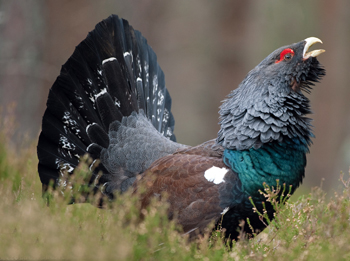RSPB ‘willing to sacrifice the capercaillie’

The capercaillie is in grave danger of dying out completely if current conservation plans are maintained, according to gamekeepers in Scotland.
The Scottish Gamekeepers Association (SGA) believes that millions of pounds of public money spent on increasing the capercaillie population is being wasted, and that the conservation efforts of groups such as the RSPB are ?self-limiting?.
National committee member Bert Burnett said: ?We feel that the RSPB cannot be trusted to make an unbiased decision with regard to what is necessary for the future survival of birds such as the capercaillie.
Fear of losing membership and public sympathy ? vital to their financial stability ? appear to be their first consideration before any action is taken.?
Over recent years, the populations of predators such as foxes and pine martens have increased dramatically, and the SGA believes that there are far fewer capercaillie left in Scotland today than the official figure of 1,228.
The RSPB claims that fencing and lack of habitat are the main reasons for the bird?s decline, but, according to Mr Burnett, there is more adequate and suitable forestry in Scotland now than there was when the bird was numerous.
He commented: ?If fully protected against over-predation, they could again expand and repopulate many parts of Scotland. Ironically, those that profess to be caring for them are letting them die out in the name of political correctness.?
?Recent experiments by the RSPB on the impact of martens on capercaillie nests showed that 18 out of 20 nests were predated, yet there has been no direct effort to eliminate or reduce this predation.?
?We believe that the RSPB is reluctant to apply for licences to remove these predators because it might upset its members, and that it also fears that any licence granted to control protected predators might open the door to all licensing, resulting in raptor controls.?
?If this is the case then the RSPB is apparently willing to sacrifice the capercaillie ? a bird in serious decline ? rather than see control of protected species, many of whose populations are at an all-time high.?








